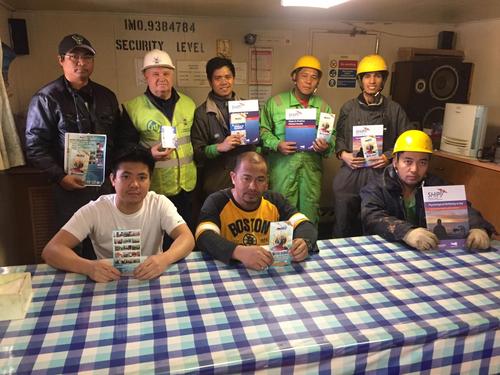ÐÎÑÑÈÉÑÊÈÉ ÏÐÎÔÅÑÑÈÎÍÀËÜÍÛÉ ÑÎÞÇ ÌÎÐßÊÎÂ
SEAFARERS' UNION OF RUSSIA
A NON-UNIONIZED SEAFARER
IS AN UNPROTECTED SEAFARER
Back
ITF Collective Bargaining Agreement should be on board every flag of convenience ship

Both vessels - “Star Masaya” (flag of Marshall Islands, IMO 9166663) and “SDL Maya” (flag of Panama, IMO 9384784) - are flying flags of convenience, but the crew of one of them are protected by the collective agreement approved by the International Transport Workers' Federation (ITF) , and the the crew of other vessel are not. Recently, Inspectors of the SUR Far Eastern Territorial Organization visited those ships. They once again made certain that every vessel flying a flag of convenience should be covered by a fair collective agreement.
“During that visit the m/v “Star Masaya” was under the loading of coal at the port of Nakhodka”, - Nikolai Sukhanov, the Chairman of SUR Far Eastern Territorial Organization said. “Though the crew’s wages are at a good level - the base rate for AB and captain are $1,364 and $ 9,360 respectively – the Filipino, Greek and Romanian crew members have no guarantees of decent employment conditions, since there is no collective agreement on board. Previously m/v “Star Masaya” was covered by the collective agreement but the document expired on March 31, 2019. The Greek company Sitinas Shipping Co did not prolong the agreement. The absence of a collective agreement between trade union and employer means the lack of control and other instruments efficient in protecting the interests of crew members. The only guarantee for seafarers working on board a ship under the flag of convenience is a collective agreement signed with trade union organization, because it secures high wages, on time wage payments, the right to apply to trade union and other significant social guarantees.
At the request of the “Star Masaya” crew, the SUR FETO is going to send to the management of Sitinas Shipping Co a notice inviting to enter negotiations on signing an ITF approved collective agreement.
On board the m/v "SDL Maya" the situation is quite different. During the visit of the trade union Inspectors the vessel was unloading tires.
“We visited that vessel in 2017, there was no collective agreement on board at that time,” Nikolay Sukhanov said. “At that time the SUR FETO sent a notice to the shipowner resulted in the negotiations between the company and the All Japan Seamen's Union (JSU) and signing the ITF approved Collective Agreement.
After that, the seafarers, covered with the Collective Agreement, have became better informed of their rights and guarantees. For example, now all crew members are aware of the size of insurance payment in the event of disability or death - $104,000. The seafarers confirm that the Japanese shipowner strictly adheres to the clauses of the agreement. In addition, after the signing of the agreement, now the interests of the “SDL Maya” crew are represented and secured by the largest seafarers’ union in the Asia-Pacific region – the ITF - affiliated JSU.
We would like to add that shipowners in countries with high tax rates use the flags of convenience like a kind of refuge, because some open shipping registers have incomparably low obligatory payments, if any. Very often seafarers working on ships under the flags of convenience have neither rights nor social guarantees, though they charged with a lot of duties. That is why the International Transport Workers' Federation and its affiliated unions, including SUR, are campaigning against flags of convenience in order to cover all such vessels by collective bargaining agreements.
Up
